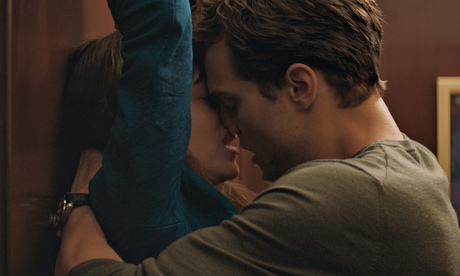
“I’m fifty shades of fucked up!” This adaptation of EL James’s BDSM potboiler struggles to make a spanking cinematic silk purse out of its notoriously tin-eared source. Dakota Johnson plays the virginal Anastasia Steele, an innocent student sent to interview Hobbit-faced billionaire Christian Grey (Jamie Dornan), who winds up being lured into his purpose-built dungeon of love. The ripped Grey holds all the money and the power, but will submission win Anastasia her heart’s desire?
Beginning life as a piece of online Twilight fan-fiction, James’s novel (the first of a trilogy) was variously linked to Joe Wright and Steven Soderbergh before Sam Taylor-Johnson sealed the deal to direct. She certainly has form; her CV not only includes a segment of the hard-core compendium Destricted, but also the short film Love You More (from a script by Patrick Marber), which exhibited a playful erotic frisson. For Fifty Shades, Marber was reportedly enlisted to rewrite James’s witlessly ear-scraping dialogue in the script, but the author retained a level of editorial veto to rival that of Stephenie Meyer. As a result, one gets the feeling that it’s not Anastasia but Taylor-Johnson who’s being restrained here, hemmed in both by a control-freak writer and the restrictions of delivering a US “R-rated” feature. (Near-subliminal glimpses aside, this retains a depressingly mainstream squeamishness about male genitalia.)
Despite citing Bertolucci’s Last Tango in Paris as a tonal touchstone, and nodding cheekily to American Gigolo/Psycho, the result smacks more of Adrian Lyne’s blandly naff 9½ Weeks, the S&M frankness of Barbet Schroeder’s Maîtresse usurped by the archaic softcore of Just Jaeckin’s The Story of O. Meanwhile, the consumer-porn accoutrements (private helicopters, fast cars, gliders) remind us that this “fantasy” has more to do with princess-in-the-tower fairytale than sexual role play, a factor emphasised by the screenwriter, Saving Mr Banks’s Kelly Marcel.
While the novel’s “inner goddess” guff is gone, Christian’s toe-curling character exposition (crack-addict mothers, Mrs Robinson molesters, “so sad” piano recitals, etc) smarts more than his leather belt ever could. As for arguments about the feminism and/or misogyny of the narrative, it’s worth noting that, like the first Twilight film, this remains an all-too-rare example of a blockbuster movie whose three key creatives (author, screenwriter, director) are women. That makes it noteworthy in industry terms; more than can be said of it artistically.

